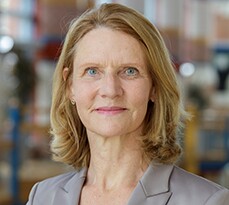Digital tech can be turned into a tool for sustainable and equitable practices in agriculture, industry and other sectors, says new report co-authored by Lucia Reisch of Cambridge Judge Business School.

Effective governance of digital technologies can contribute to ambitious goals for social and environmental sustainability, according to a new report co-authored by Lucia Reisch, El-Erian Professor of Behavioural Economics and Policy at Cambridge Judge Business School.
The report, designed to provide a blueprint for the European Union, looks at how policies on digital technology can improve the sustainability of sectors including agriculture, mobility, energy, consumption, and building construction and management, improving social equity.
Current shortcomings of digitisation in achieving results
“The state of scientific knowledge demonstrates that digitalisation, in its current and mainstream form, does not deliver solutions and that incremental changes are insufficient to remedy this situation,” says the 103-page report, entitled Digital Reset: Redirecting Technologies for the Deep Sustainability Transformation.
The report, which stems from a two-year project called Digitisation for Sustainability – Science in Dialogue (D4S) was unveiled at a recent event in Berlin.
“There are many useful digital technologies in niches. But by and large, the current form of digitalisation is contributing to increasing socioeconomic inequalities and negative environmental effects, possibly outweighing the benefits,” Lucia said in introducing the report.
Europe-wide collaboration in compiling the report
The D4S project is coordinated at the Einstein Center Digital Future and the Technical University of Berlin, and is funded by the Robert Bosch Foundation. The project involves academics including Lucia and others from universities in the UK, Germany, Sweden, Norway and Switzerland, as well as representatives of the European Commission and the private sector who deal with digital and societal issues.
Lucia is Director of the El-Erian Institute of Behavioural Economics and Policy at Cambridge Judge, and has for 2 decades looked at the the link between public policy and behaviour. She hosted a webinar earlier this month organised by the Executive Education division of Cambridge Judge Business School, entitled “Nudge, budge, shove and boost: how policy can drive pro-environmental behaviour”.
Seven principles for starting a digital reset
The D4S report outlines 7 principles for digital technologies that should serve as the starting point for a Digital Reset:
- regenerative design in software and hardware
- system innovations that alter the basic operational patterns of sectors rather than seek incremental changes
- sufficiency in aiming to seek enough rather than more
- circularity in production patterns in many sectors including ICT
- sovereignty in enlarging citizens’ freedom of choice
- resilience in fostering economic decentralisation and distributed economies
- improving social and environmental equity.
Advice for individual sectors
In terms of individual sectors, the report calls for:
- In agriculture, the use of digital technologies to support a transformation toward locally adapted and ecological farming practices.
- In mobility, the opening up of data and code to advance mobility applications and platforms that foster low-carbon multimodal mobility rather than high-tech automobile transportation.
- In industry, technology use to promote the circular economy rather than growth-dependent linear models.
- In energy, improved digitisation use to support distributed systems based on 100% renewable energy carriers.
- In the building sector, fostering a “new data culture” that can decrease demand for new construction, facilitate design and refurbishment circularity, and reduce energy consumption in building operation.
- In general consumption of goods and services, using digital policies to promote greener products and sufficiency-oriented habits.
Can an Information Revolution correct the errors of the Industrial Revolution?
“Now is the time,” the report concludes. “At the beginning of the 3rd millennium, it is up to us to determine where the Information Revolution will take us. We can use it to correct the errors of the Industrial Revolution – namely, its skyrocketing environmental footprint – and eventually fulfil its promise of a decent life and prosperity for all. “It is entirely possible that future historians ponder the 2020s as the key turning point when amidst multiple crises, steps were taken for a Digital Reset that is fully focused on solving these crises.”
The study
The study – entitled Digital Reset: Redirecting Technologies for the Deep Sustainability Transformation – is co-authored by Steffen Lange, Tilman Santarius, Lina Dencik, Tomas Diez, Hugues Ferreboeuf, Stephanie Hankey, Angelika Hilbeck, Mattias Höjer, Lorenz Hilty, Dorothea Kleine, Johanna Pohl, Lucia Reisch, Marianne Ryghaug, Tim Schwanen and Philipp Staab.


